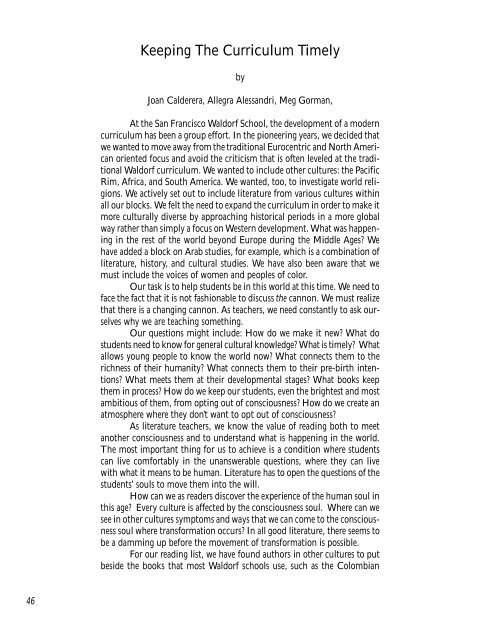Colloquium on English - Research Institute for Waldorf Education
Colloquium on English - Research Institute for Waldorf Education
Colloquium on English - Research Institute for Waldorf Education
Create successful ePaper yourself
Turn your PDF publications into a flip-book with our unique Google optimized e-Paper software.
46<br />
Keeping The Curriculum Timely<br />
by<br />
Joan Calderera, Allegra Alessandri, Meg Gorman,<br />
At the San Francisco <strong>Waldorf</strong> School, the development of a modern<br />
curriculum has been a group ef<strong>for</strong>t. In the pi<strong>on</strong>eering years, we decided that<br />
we wanted to move away from the traditi<strong>on</strong>al Eurocentric and North American<br />
oriented focus and avoid the criticism that is often leveled at the traditi<strong>on</strong>al<br />
<strong>Waldorf</strong> curriculum. We wanted to include other cultures: the Pacific<br />
Rim, Africa, and South America. We wanted, too, to investigate world religi<strong>on</strong>s.<br />
We actively set out to include literature from various cultures within<br />
all our blocks. We felt the need to expand the curriculum in order to make it<br />
more culturally diverse by approaching historical periods in a more global<br />
way rather than simply a focus <strong>on</strong> Western development. What was happening<br />
in the rest of the world bey<strong>on</strong>d Europe during the Middle Ages? We<br />
have added a block <strong>on</strong> Arab studies, <strong>for</strong> example, which is a combinati<strong>on</strong> of<br />
literature, history, and cultural studies. We have also been aware that we<br />
must include the voices of women and peoples of color.<br />
Our task is to help students be in this world at this time. We need to<br />
face the fact that it is not fashi<strong>on</strong>able to discuss the cann<strong>on</strong>. We must realize<br />
that there is a changing cann<strong>on</strong>. As teachers, we need c<strong>on</strong>stantly to ask ourselves<br />
why we are teaching something.<br />
Our questi<strong>on</strong>s might include: How do we make it new? What do<br />
students need to know <strong>for</strong> general cultural knowledge? What is timely? What<br />
allows young people to know the world now? What c<strong>on</strong>nects them to the<br />
richness of their humanity? What c<strong>on</strong>nects them to their pre-birth intenti<strong>on</strong>s?<br />
What meets them at their developmental stages? What books keep<br />
them in process? How do we keep our students, even the brightest and most<br />
ambitious of them, from opting out of c<strong>on</strong>sciousness? How do we create an<br />
atmosphere where they d<strong>on</strong>’t want to opt out of c<strong>on</strong>sciousness?<br />
As literature teachers, we know the value of reading both to meet<br />
another c<strong>on</strong>sciousness and to understand what is happening in the world.<br />
The most important thing <strong>for</strong> us to achieve is a c<strong>on</strong>diti<strong>on</strong> where students<br />
can live com<strong>for</strong>tably in the unanswerable questi<strong>on</strong>s, where they can live<br />
with what it means to be human. Literature has to open the questi<strong>on</strong>s of the<br />
students’ souls to move them into the will.<br />
How can we as readers discover the experience of the human soul in<br />
this age? Every culture is affected by the c<strong>on</strong>sciousness soul. Where can we<br />
see in other cultures symptoms and ways that we can come to the c<strong>on</strong>sciousness<br />
soul where trans<strong>for</strong>mati<strong>on</strong> occurs? In all good literature, there seems to<br />
be a damming up be<strong>for</strong>e the movement of trans<strong>for</strong>mati<strong>on</strong> is possible.<br />
For our reading list, we have found authors in other cultures to put<br />
beside the books that most <strong>Waldorf</strong> schools use, such as the Colombian

















